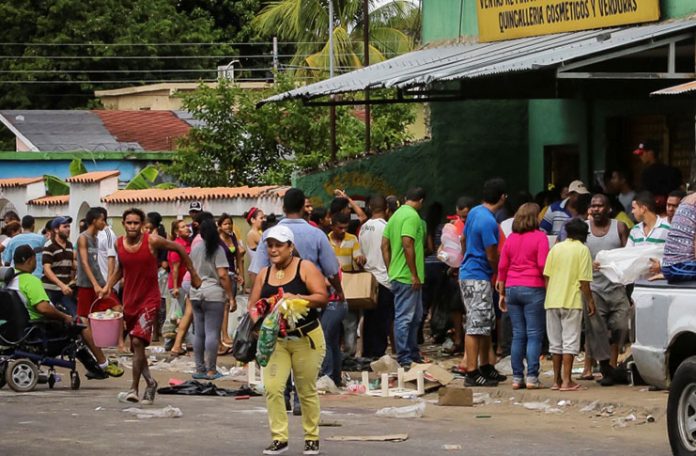Queuing for food in neighbouring Venezuela’s Ciudad Bolivar
Source
April 18, 2017
Fleeing hard times –Guyanese living in Venezuela returning home
–cite food crisis, political unrest
By Zena Henry
THE decline of neighbouring Venezuela’s economy and the resultant strain on its cost of living is causing many Guyanese living there to think seriously about coming back home.
This is according to Guyana’s Ambassador to Venezuela, Ms Cheryl Miles during an update on Guyana-Venezuela relations at the conclusion of a heads of missions conference held here recently at the Pegasus Hotel.
Guyana and Venezuela are still to resolve a decades-old border controversy currently being managed by the United Nations. In a televised interview with the Ministry of Foreign Affairs, Miles explained that since her posting to Venezuela, much of her work has been in relation to the Diaspora which makes up some 250,000 Guyanese living in Venezuela.
And, despite the social state the country is in, she said, many Guyanese are holding their own, but some are having second thoughts.
“Many people now are thinking of returning to Guyana because of the difficulties in Venezuela,” the veteran diplomat said.
She said that while many persons are seeking guidance on how they can reintegrate into Guyanese society, in many cases, they are concerned that because their children may not have learned English in a structured way, that could be a hindrance in their being able to attend school in Guyana. “We are trying to see in what ways we can make it easier for them to reintegrate,” Miles said, adding that it is one of the tasks with which the Embassy is currently preoccupied.
CROSS-BORDER TRADE
This newspaper had reported back in February that scores of Venezuelans would regularly cross the border at Kumaka, in Region One (Barima-Waini) to do business. According to Kumaka residents at the time, this is what had obtained throughout 2016, as the economic situation in Venezuela took a turn for the worse.
Media reports have since suggested that supermarket shelves in Venezuela are chronically bare, and power shortages are so severe that government offices are forced to only open two days a week.
Add to this the collapse of the healthcare system, the spiralling crime rate, and progressively worsening inflation, and one could well imagine the state of play in Venezuela these days.
And as the New York Times had reported, with the plummeting of the price of oil, Venezuela’s only export of note, this means revenues could fall by as much as 40 per cent this year.
It’s a situation that has, since earlier in the year, resulted in a number of Venezuela-based Guyanese relocating to the place they once called home within communities in the North West District.

According to Kumaka residents, many persons who had relocated to Venezuela during the 1980s have since returned to the North West in search of greener pastures.
“They come across with fuel and plastic containers and clothes, and take back sugar, rice and even things like toilet paper,” a Kumaka vendor named Michael said of those Venezuelans coming here to trade items that are difficult to source in their homeland.
He said that the goods brought here by the Spanish-speaking traders are sold dirt cheap. “A set of bowls, the ones with more than one, you can get that cheap,” Michael said.
KUMAKA FRONT
At the Kumaka Waterfront, several stalls would line the edges of the roadway close to the Aruka River, a sight that was almost non-existent prior to the collapse of the Venezuelan economy.
The area was once a matter of concern in the past, as water from the meandering Aruka River had almost eroded that section of the waterfront in recent years. However, revetment works were undertaken in the area and it has since stood the test of time. Consumer items that do exceedingly well at Kumaka include fuel, such as gasoline, which retails at approximately G$17,000 per barrel. The price reportedly dropped significantly a month ago when the authorities clamped down on the trade of fuel at Morawhanna.
At the time, the price per barrel had risen to approximately $28,000.
“We buy gas at about $400 a gallon,” a minibus driver had told this publication at Kumaka. He said that when the authorities visit the area, the prices would increase. Last December, Commissioner General of the Guyana Revenue Authority (GRA), Mr Godfrey Statia, spoke on the issue of fuel-smuggling in the area. “We also know there is fuel-smuggling in the Essequibo, in Morawhanna; we also plan to put a presence at Morawhanna,” Statia was quoted as telling the media at the time.
At the remote villages outside Mabaruma, persons would trade mainly food items with Venezuelans across the Amacuro River. The goods are usually bought at Kumaka and ferried to the border location, a practice which is not expected to end anytime soon.
BORDER CONTROVERSY
As Ambassador Miles pointed out regarding the border controversy between Guyana and Venezuela, Georgetown maintains the firm position that the matter should go to the international court.
She drew reference to the recent visit of the UN General-Secretary’s personal representative, Ambassador Dag Nylander who was here to help the two countries find a solution to the problem by the end of the year.
If this does not happen, then recommendations will be given by the UN on how the controversy should be handled, with the matter’s referral to the International Court of Justice being the likely outcome.
“Our sides are very far apart,” Ambassador Miles said. “We would like to see the issue go to the International Court of Justice; it is our firm position, and Venezuela doesn’t want that. They prefer a different form of settlement.”

